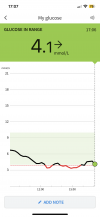Fenn
Well-Known Member
- Messages
- 1,405
- Type of diabetes
- Type 1.5
- Treatment type
- Insulin
Hi, would anyone know please…
I am doing strict keto currently 20g roughly per day, I am also doing intermittent fasting 16-20 hours fasting per 24 hour.
This is working out great for me, I am finding it easy and my numbers, (which have recently (6 month ish) been terrible, 30% in 4-10 range)
have been amazing, 99% in range. Ketones 2.5 on average, 1-4.
My insulin has reduced a lot. I am often injecting 1 unit or 0 units for meals, my levemir is at 4 units am and pm
I am very keen to carry on doing this obviously, I have been going hypo in the night disturbing my sleep but didn’t want to Do anything as it was like 3.8,3.5, but from about 11:30am to 4pm today I was hypo all afternoon at work, I will attach picture if I can make it work.
So finally my question *phew* I didn’t want to treat the hypo as I ate a ham salad at 11am and figured this would eventually kick in and raise me up a bit (no novorapid) but it only popped me into the green for a bit then went back down grrr, I didn’t treat it as didn’t want to drop out of ketosis, But at 3.0 I felt fine, usually I feel ****** by then. Is it possible that the ketones are giving me (especially my brain) what I need to be ok without correcting the hypo? Can I keep reducing the insulin dose with ketones without fear of DKA? So basically am I good to go if it happens again?
Thankyou if you know, sorry for the long lead up to the question.

I am doing strict keto currently 20g roughly per day, I am also doing intermittent fasting 16-20 hours fasting per 24 hour.
This is working out great for me, I am finding it easy and my numbers, (which have recently (6 month ish) been terrible, 30% in 4-10 range)
have been amazing, 99% in range. Ketones 2.5 on average, 1-4.
My insulin has reduced a lot. I am often injecting 1 unit or 0 units for meals, my levemir is at 4 units am and pm
I am very keen to carry on doing this obviously, I have been going hypo in the night disturbing my sleep but didn’t want to Do anything as it was like 3.8,3.5, but from about 11:30am to 4pm today I was hypo all afternoon at work, I will attach picture if I can make it work.
So finally my question *phew* I didn’t want to treat the hypo as I ate a ham salad at 11am and figured this would eventually kick in and raise me up a bit (no novorapid) but it only popped me into the green for a bit then went back down grrr, I didn’t treat it as didn’t want to drop out of ketosis, But at 3.0 I felt fine, usually I feel ****** by then. Is it possible that the ketones are giving me (especially my brain) what I need to be ok without correcting the hypo? Can I keep reducing the insulin dose with ketones without fear of DKA? So basically am I good to go if it happens again?
Thankyou if you know, sorry for the long lead up to the question.

Last edited:

